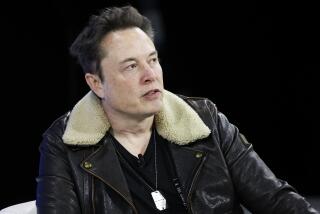A U-Turn for Hyundai : Auto Maker Going Back to Its Original ‘Cars That Make Sense’ Ad Theme
IRVINE — A newly confident Hyundai Motor America has scrapped its defensive “Hyundai? Yes, Hyundai!” ad campaign and returned to its original “Cars That Make Sense” theme in a bid to persuade economically battered consumers to take a new look at the South Korean car maker’s products.
A key to Hyundai Motor America’s bold new advertising approach is the Fountain Valley importer’s confidence that it has recognized and overcome the quality and reliability problems that plagued its early Excel models.
The National Transportation Safety Board, for example, announced Monday that it is studying reports of unexplained drive-wheel lockups affecting some of the 500,000 Hyundai Excels sold from 1986 to 1989.
The challenge for Hyundai and its ad agency is to produce a campaign that will make consumers believe the quality story, said Jim Hillson, senior vice president of Phase One, an automotive advertising research company in Beverly Hills.
“If they can just get people to suspend their doubts and come down and check out the cars and the warranty program, then they can succeed,” he said.
Hillson said he thinks Hyundai’s decision to go back to its initial ad slogan was a wise one. “They originally sold well by telling consumers that Hyundai was a smart choice, and with a really smart, provocative campaign that says ‘Let us tell you what we’ve got before you look elsewhere,’ ” he said, the company can build customer traffic and let its dealers demonstrate the product’s price and value attributes.
The campaign, produced by the Irvine office of New York ad agency Backer Spielvogel Bates Inc., is the first in Hyundai’s brief U.S. history to feature the company’s full line of vehicles. Hyundai previously advertised each model individually--a strategy that some analysts said hurt its efforts to tell consumers that it was more than the car company that made the Excel, which is both its best-selling model and the product whose early problems soured many buyers on the Hyundai name.
And, in its print form, the campaign also is the first to compare Hyundai models directly with the competition’s. One proposed newspaper ad, for example, blasts Toyota for offering a $16,000 subcompact Corolla under the headline, “Oh! What You Don’t Do for Me, Toyota!”
Hyundai’s base prices for the 1993 model year range from $6,799 for the Excel to $12,399 for the Sonata.
Cornerstones of the ad campaign, which begins next week, are Hyundai’s prices and the company’s commitment to reliability, which is backed by a package that includes a two-year, 24,000-mile free service and maintenance plan; three-year, 36,000-mile bumper-to-bumper warranty and roadside assistance plan; and five-year, 60,000-mile powertrain warranty.
In its most powerful full-line ad, which begins airing on national television Oct. 19, the narrator acknowledges that “if you want a new car for under $15,000, you have 221 choices.” But if you want two years of free service on that car, the voice-over continues as a powerful arm sweeps 217 of the car models off a tabletop, you have four choices: the Hyundai Excel, Scoupe, Elantra and Sonata.
Hyundai shocked the U.S. automobile world in 1986 when it introduced the Excel and immediately began setting sales records with the $4,995 subcompact. But consumer complaints about lack of power, overheating, weak brakes and other quality and reliability shortcomings soon overpowered Hyundai’s price advantage.
In its first year in the United States, Hyundai sold a record-breaking 168,882 cars--all subcompact Excels. In 1988, just two years after its launch, the importer reported annual U.S. sales of 264,282 Excels.
But then, despite introduction of the larger Sonata, the Hyundai juggernaut slammed into a wall. Sales in 1989 plunged 31% to 183,261 cars, and the annual sales tally has dropped each year since then, even as Hyundai has expanded its product line.
Hyundai officials expect to log 120,000 sales this year but have said that they expect the sales curve to turn upward starting in 1993, when they are projecting 125,000 sales.
From now through 1999, Hyundai plans to introduce a new product each year. The first will be the turbocharged Scoupe sports coupe, which will hit dealer showrooms in November. A redesigned Sonata, the company’s top-of-line compact, is due out next year, and a two-seat roadster has been promised by 1995.






